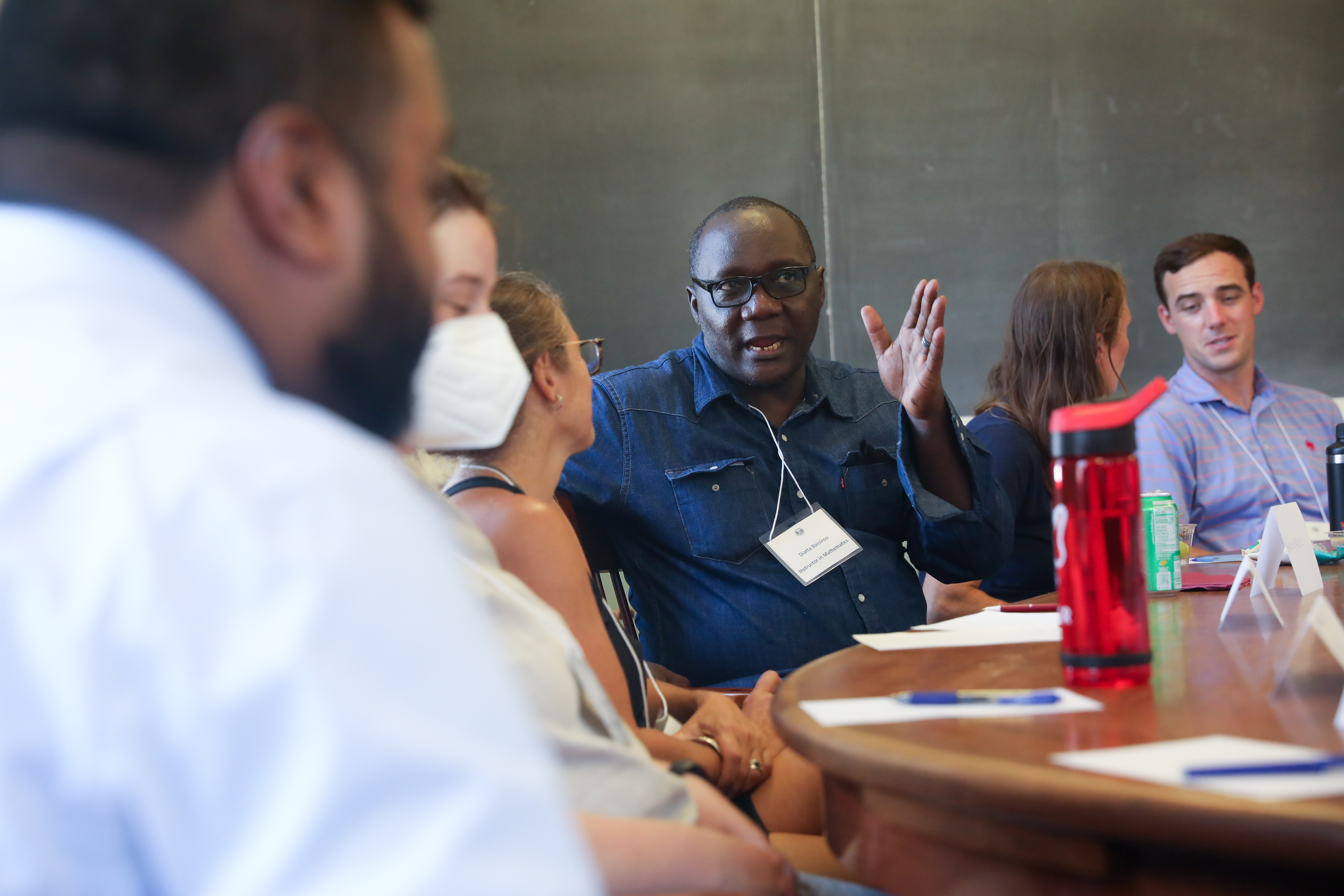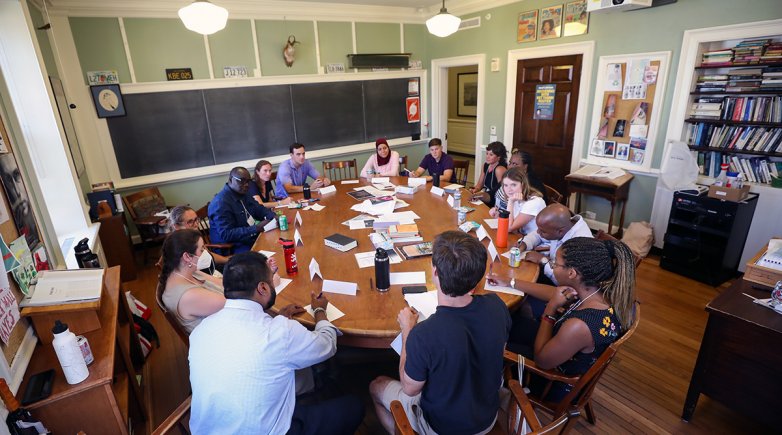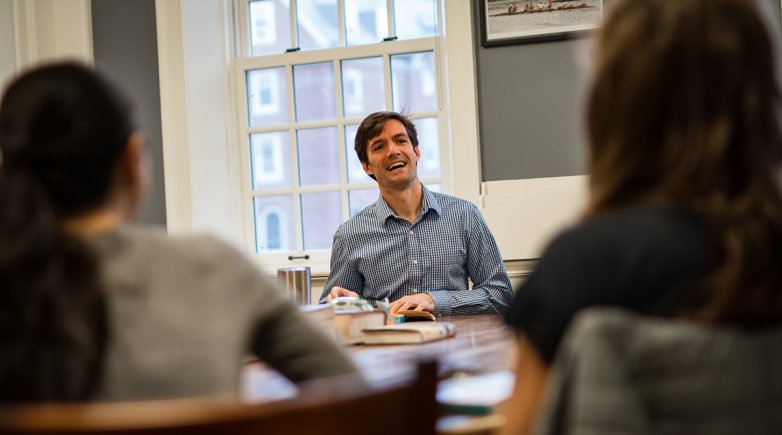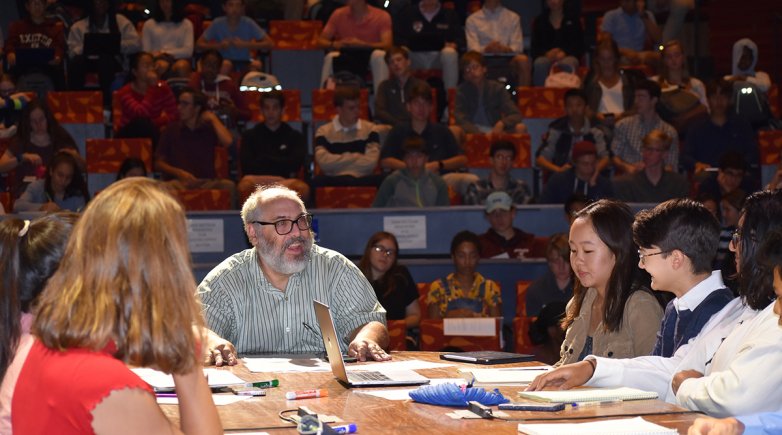For new faculty, class is in session
Incoming instructors, coaches and administrators come together around the table for Harkness training.
In the waning days of August, Exeter’s newest faculty members gather on campus for three days of orientation. Day 1’s agenda is jampacked and highlighted by a Harkness workshop with an interesting reversal of roles.
Filling seats around oval tables in Phillips Hall and the Academy Building, the new faculty become the students as Instructor in Mathematics Laura Marshall and Instructor in English Tyler Caldwell lead demonstration classes in their respective subjects. An introduction to the Harkness method for some and a refresher for others, the main tenants of pedagogy — exploration, collaboration and problem-solving — are on display as the exhibitions play out.
A 16-year veteran of Exeter, Marshall begins her class with brief introductions followed by a mathematical puzzle of sorts, and before long the room fills with conversation and the faint smell of dry-erase markers. Teams of two or three fan out across the room, fervently filling up whiteboard space.
New Instructor in Math Jess Emory, and Associate Director of College Counseling Jameel Moore, hired in the spring, start by focusing on what they know to be true about the given problem. The two quickly deduce the answer “has something to do with factors.”
Marshall works the room, making herself available as the groups push forward. She looks on as the team of Instructor in Theater Blythe de Oliveira Foster ’97, Phillips Fellow in English Sherard Harrington and Instructor in Science Christina Zeigler talk through their collective thought process. Sensing the opportunity for reinforcement, Marshall asks the group, “Are you convinced dividing the square into four is possible?”
“I was,” Zeigler responds with a laugh.
In asking questions, Marshall is encouraging the group to be confident in what they know to be true and reassess what they cannot prove. Her visit motivates the group to refocus and take a new line of thinking.
Back on the other side of the room, Emory steps back from the board and says to Moore, “I feel good about it.” The two bump fists and part to freelance their support to other groups still in progress.
Across the quad in Phillips Hall, 14 new faces quietly surround the Harkness table in Room 202. A stuffed jackalope — a mythical jackrabbit with antelope horns — mounted above the chalkboard peers over the pupils. A clock that stopped yesterday or in early June suspends time at 4:32.
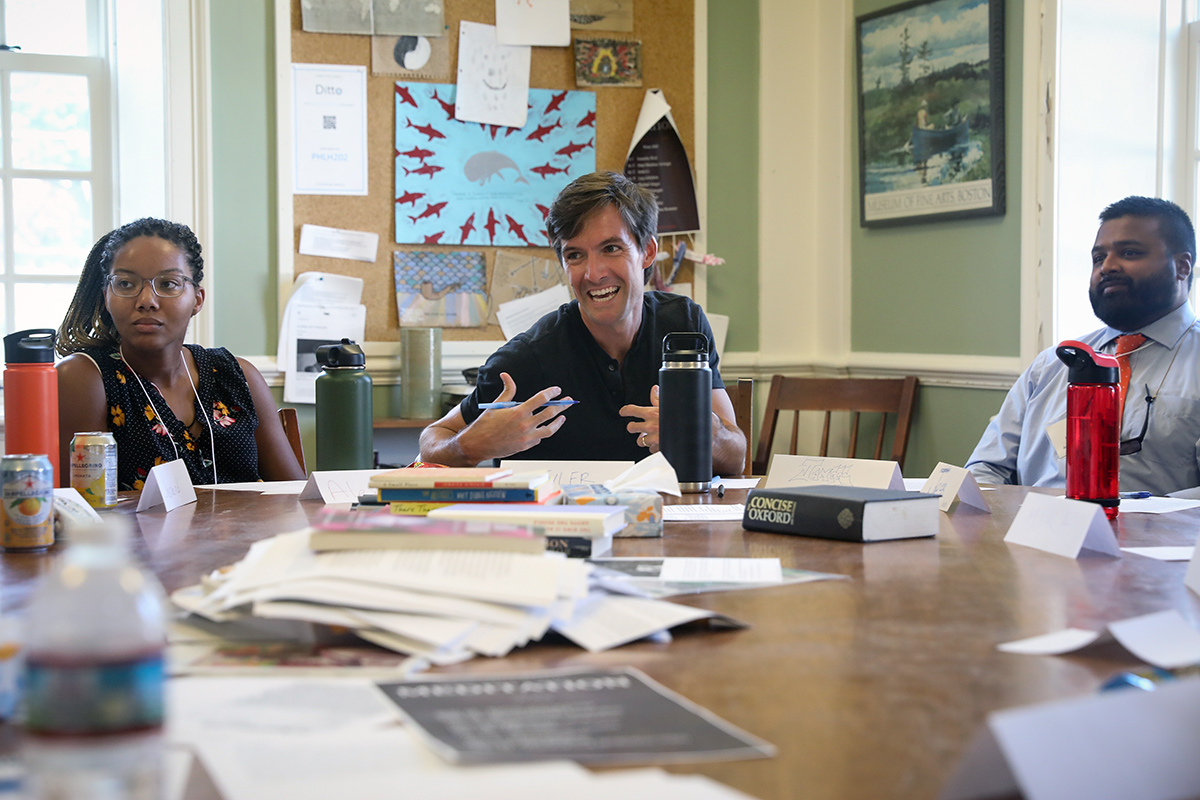
Phillips 202 is the domain of the English Department, and Instructor Tyler Caldwell sits at one end of the Harkness table as his class settles in. He asks his students — and newest colleagues — to make introductions and then answer three questions about themselves on a piece of paper. The smothering silence of the task implodes when they turn to a neighbor to share the answers.
With the ice thawing, Caldwell gives them their real assignment: Read and discuss Aimee Nezhukumatahil’s poem, “Mosquitoes.” The piece is from a collection all new students have been assigned to read over the summer. It follows the evolution of a daughter’s relationship with her father.
The teachers read the poem to themselves three times, first without taking notes, then marking up the passage. Finally, they read aloud, seven new instructors taking a stanza each:
When my father wanted to point out galaxies
or Andromeda or the Seven Sisters, I’d complain
of the huzz of mosquitoes, or of the yawning,
moon-quiet in that slow, summer air.
When the read-aloud ends, the conversation begins. Karen Latham, an instructor in mathematics, observes the passage of time through the poem. Lina Wang, an intern in classical languages, agrees, noting that as time passes and the poem progresses, the poet’s language takes on a wonder and awe the early stanzas lack.
Nicole Fowler, a strength and conditioning coach, points out the disdain and “minutiae” of Nezhukumatahil’s word choices in the beginning give way to appreciation — how the moons of Jupiter dance if you catch them on a clear night.
Marcus Rabb, an instructor in music, notes how the father is the one searching the skies in the beginning, but that pursuit shifts to the daughter’s longing for lost moments from her childhood. “Now she’s the one searching,” he says. The piece resonates with him. His father passed away two years ago, he tells the group, and at this time of year they would talk on the phone for hours about the coming football season.
“Wow, this has put me in a whole different mood,” he adds. “Someone tell some jokes!”
Rabb’s personal story throws wide open the spigot. The examination of the poem is peppered with personal reflections, and everyone offers a perspective. Caldwell is pleased with the exercise — not just his colleague’s astute analysis of the poem, but their willingness to dive into the assignment and share their points of view. This is Harkness.
“It’s important for us to experience what our student’s experience five times a day,” he tells them.
“There was a nervousness at first, but I like how we got to know each other as we listened to each other,” notes Sahar Ullah, an instructor in English. “That’s always amazing.”
“I know the poem was about the passage of time, but the time went very quickly here,” adds Latham. “I felt heard and valued.”
